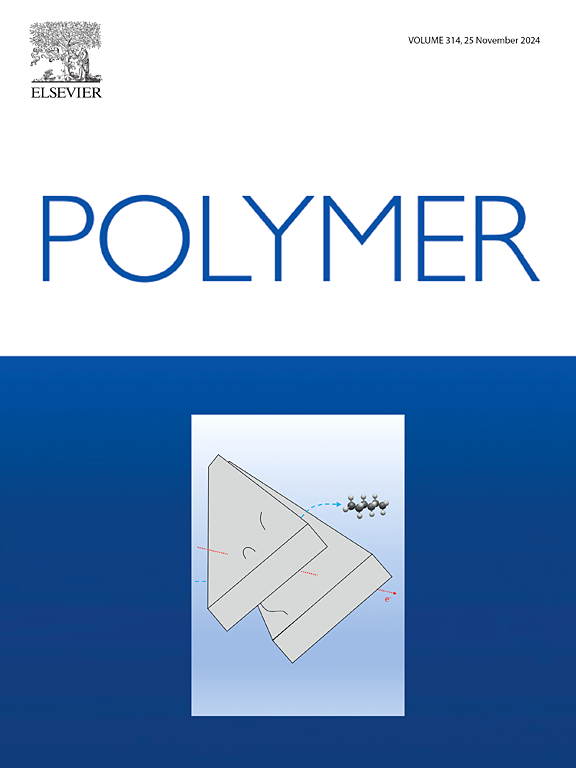溶液法制备解缠长链支化聚丙烯的性能及缓复过程研究
IF 4.1
2区 化学
Q2 POLYMER SCIENCE
引用次数: 0
摘要
稀聚合物溶液的冷冻干燥是一种被广泛接受的制备解缠聚合物的方法。许多研究指出,缠结密度的降低对聚合物的流变学和结晶行为有很大影响,但在再加热的情况下会发生重新缠结,这不利于解缠聚合物的二次加工。聚合物的支链结构可以减缓分子链的弛豫过程,从而延缓缠结的恢复。本文采用溶液法制备了解缠长链支化聚丙烯(LCB-PP)。研究了解缠LCB-PP的流变行为、结晶行为、缠结恢复及力学性能。结果表明,LCB-PP的模量和复合粘度随纠缠密度的减小而减小。LCB-PP的解缠对结晶动力学有显著的正向影响,而对屈服强度、弹性模量和断裂伸长率的影响较小。LCB- pp的纠缠恢复时间远长于i-PP,说明LCB结构对纠缠恢复有阻滞作用。本文章由计算机程序翻译,如有差异,请以英文原文为准。


Research on performances and retarded recovery process of disentangled long chain branched polypropylene prepared by solution method
Freeze-drying of dilute polymer solution is a widely accepted method to yield disentangled polymer. Many researches have pointed out that reduction of entanglement density has a big impact on rheology and crystallization behavior of polymer, but the re-entangling would take place in the case of reheating, which is unfavorable to the secondary processing of disentangled polymer. The branched structure of polymer could slow down the relaxation process of the molecular chain, which may delay the recovery of entanglement. In this work, the disentangled long chain branched polypropylene (LCB-PP) was prepared by solution method. The rheological behavior, crystallization behavior, entanglement recovery and mechanical performance of disentangled LCB-PP were investigated. The results showed that the moduli and complex viscosity of LCB-PP decreases with entanglement density decreasing. The disentanglement of LCB-PP has significantly positive effect on crystallization kinetics, while slightly affects the yield strength, elastic modulus and elongation at break. The entanglement recovery time of LCB-PP is much longer than that of i-PP which indicates the retardation effect of LCB structure on entanglement recovery.
求助全文
通过发布文献求助,成功后即可免费获取论文全文。
去求助
来源期刊

Polymer
化学-高分子科学
CiteScore
7.90
自引率
8.70%
发文量
959
审稿时长
32 days
期刊介绍:
Polymer is an interdisciplinary journal dedicated to publishing innovative and significant advances in Polymer Physics, Chemistry and Technology. We welcome submissions on polymer hybrids, nanocomposites, characterisation and self-assembly. Polymer also publishes work on the technological application of polymers in energy and optoelectronics.
The main scope is covered but not limited to the following core areas:
Polymer Materials
Nanocomposites and hybrid nanomaterials
Polymer blends, films, fibres, networks and porous materials
Physical Characterization
Characterisation, modelling and simulation* of molecular and materials properties in bulk, solution, and thin films
Polymer Engineering
Advanced multiscale processing methods
Polymer Synthesis, Modification and Self-assembly
Including designer polymer architectures, mechanisms and kinetics, and supramolecular polymerization
Technological Applications
Polymers for energy generation and storage
Polymer membranes for separation technology
Polymers for opto- and microelectronics.
 求助内容:
求助内容: 应助结果提醒方式:
应助结果提醒方式:


